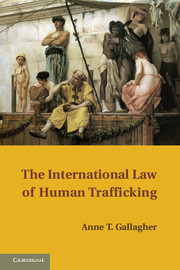Book contents
- Frontmatter
- Contents
- Preface
- Table of Cases
- Table of Treaties and Other International Instruments
- Table of Common Abbreviations
- THE INTERNATIONAL LAW OF HUMAN TRAFFICKING
- Introduction
- 1 The International Legal Definition
- 2 The International Legal Framework
- 3 Specific Legal Issues
- 4 State Responsibility for Trafficking
- 5 Obligations of Protection and Support
- 6 Obligations Related to Repatriation and Remedies
- 7 Obligations of an Effective Criminal Justice Response
- 8 Obligations to Prevent Trafficking and Respond Lawfully
- 9 Issues of Compliance, Implementation, and Effectiveness
- Epilogue
- Select Bibliography
- Index
- References
4 - State Responsibility for Trafficking
Published online by Cambridge University Press: 10 January 2011
- Frontmatter
- Contents
- Preface
- Table of Cases
- Table of Treaties and Other International Instruments
- Table of Common Abbreviations
- THE INTERNATIONAL LAW OF HUMAN TRAFFICKING
- Introduction
- 1 The International Legal Definition
- 2 The International Legal Framework
- 3 Specific Legal Issues
- 4 State Responsibility for Trafficking
- 5 Obligations of Protection and Support
- 6 Obligations Related to Repatriation and Remedies
- 7 Obligations of an Effective Criminal Justice Response
- 8 Obligations to Prevent Trafficking and Respond Lawfully
- 9 Issues of Compliance, Implementation, and Effectiveness
- Epilogue
- Select Bibliography
- Index
- References
Summary
In every system of law, responsibility as a legal institution plays a leading part because it both organizes and reveals the level of integration of this system, as well as the prevailing conceptions inside it regarding the nature of rights and of obligations, the consequences of their infringement and, perhaps more deeply, the ethical and social foundations of the whole. The establishment of a certain type of responsibility requires contemplation of the relationship it defines between the subjects of law, their acts and the community to which they belong.
The allocation of responsibility for violations of international law is critical to that system's effectiveness and credibility. The central claim of this study is that international law requires States (and, under certain circumstances, other entities) to be held answerable for their acts and omissions that cause or otherwise contribute to trafficking. The scant attention paid to State responsibility in the legal literature on trafficking suggests that this aspect of law is of marginal, perhaps only historical importance. This is both a legal and strategic mistake. Certainly, formal recourse to doctrines of State responsibility through international courts and tribunals is relatively uncommon. Such recourse is expensive, time-consuming, and often not seen to be in the long-term interests of even those States directly affected by a breach of legal obligation. It is to be expected that the development of treaty regimes establishing supervisory mechanisms and compliance procedures will further lessen the perceived need for formal invocation of responsibility.
- Type
- Chapter
- Information
- The International Law of Human Trafficking , pp. 218 - 275Publisher: Cambridge University PressPrint publication year: 2010
References
- 1
- Cited by



